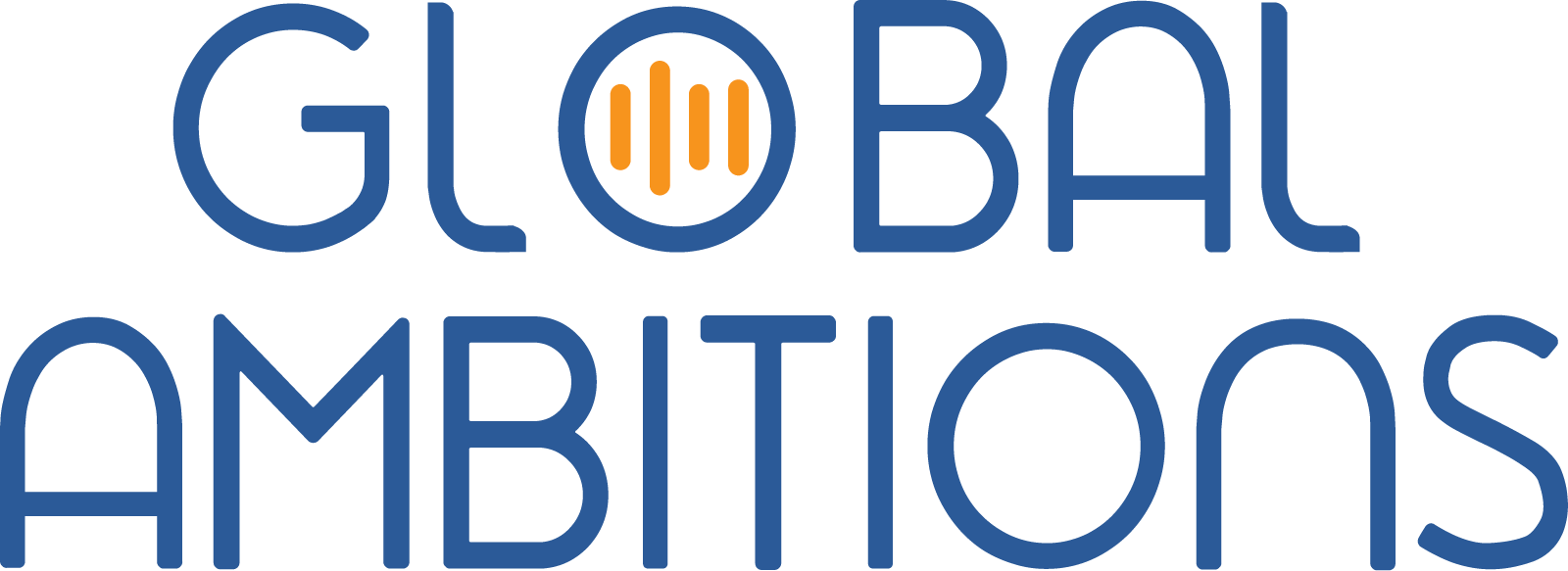With Eike-Marie Eiting, Localization Manager at Jimdo
Below is a full transcript of this episode
Antoine Rey
Hi, I’m Antoine Rey and I’ll be your host today for this Global Ambitions podcast. And today my guest is Eike-Marie, localization manager at Jimdo, and we’ll be talking about her journey from a reactive to managed localization process and beyond. Eike, welcome to the program.
Eike-Marie Eiting
Hi, thanks for having me.
Antoine Rey
So I’ll go straight into it. So you’ve been working at Jimdo for a while now, and from our conversation, in the early days, the company was quite reactive to certain market forces. Can you talk to us about this in terms of localization?
Eike-Marie Eiting
Of course. Yes. At least some of the cooperations or language locales that we have had a more reactive approach. For example, the Japanese language that we offer was the result of cooperation, an initiative by a company called KDDI, which is our cooperation partner. Who saw an article about Jimdo in TechCrunch in the very early days and decided that they wanted to bring Jimdo to Japan. So it was not Jimdo trying to internationalize and going outward, but it was Japan approaching us.
We had other locations where we established country teams and tried to do it in a more active way. But all in all, I would say the early days were a more reactive stage of localization.
Antoine Rey
And so the trigger, in this case, was a company in Japan was interested in bringing your product to the market? Can you tell us then in terms of the reactive side of things, what did you have to do? Because I presume the product may not have been completely internationalized or some of it only and other aspects that you had to take into consideration to launch the product in the Japanese market?
Eike-Marie Eiting
I don’t know, since it’s such a long time ago. So I mean, I’ve been with Jimdo since 2011, but I was in different roles back then. I moved to be localization manager three years ago. So in my understanding, what we had at that time was an internationalization infrastructure from the development side, but we didn’t have a localization team or a process infrastructure.
So the way this cooperation was set up is that we decided that Jimdo takes care of the product part. And KDDI, the cooperation partner, takes care of marketing and customer service. So the areas which needed high localization, they took the lead on that side and created content directly in the market. They created content directly. They established ways how to market the product in the Japanese market, and they also provided customer service. And we aligned whenever possible, but also had clarity that the Japanese team had freedom for their own choices and decisions.
So sometimes they would send different emails or invest more into communication for certain issues, features, whatever. Some features we would not release directly in the Japanese market at that point in time. We have, for example, in the past when we had a rebranding, the Japanese team decided that they wanted to keep one icon that we had decided to stop using on the European market, for example.
Antoine Rey
That’s an interesting concept and something that I see quite a lot. A trend happening in the markets where, from a marketing perspective, a lot of companies trying to attract people to a platform opt for content origination as opposed to localizing content from English or from German for instance, in this case. And that seems to be working fairly well, combined with an SEO strategy. We’re seeing this more and more in terms of campaigns or articles, blogs, you know. And so that ended up being a successful marketing strategy for you guys in Japan?
Eike-Marie Eiting
Yeah, definitely. So I think the advantage for our team at that point in time was that there was knowledge about the Japanese market. We did not need to acquire that knowledge in a sense, right? I think you can also have it in a different way than when you want to internationalize into specific markets that you approach companies that help you do it, that have this knowledge. But in this case, it was a company that approached us.
Antoine Rey
Right.
Eike-Marie Eiting
But I think the outcome of the benefit of having a partner who knows the local market quite well definitely is positive, right? I remember that we also tried to expand to China, for example. We also integrated or worked together with someone who knew that market quite well and was based in China as well. But that market was a lot more difficult to open up and would have required a lot more investment. So at some point, we decided to stop it.
I think it also has to do with the partner who approached us in Japan. It is a very big known entity partner. It’s KDDI, so it’s also a very established company and not a consultant or someone who tries to bring other companies to the market. And they have a specialized area that focuses on bringing different products and make them fit for the Japanese market. So they also have corporations with Canva and Twilio and most likely other projects as well.
Antoine Rey
Pick your partners carefully in that case, I guess.
Eike-Marie Eiting
Exactly, exactly.
Antoine Rey
Then you came back to the company and you were asked to manage localization. And so this is where it started to move from a reactive approach to something that looks more managed. Do you want to tell us about this a little bit?
Eike-Marie Eiting
Yes. Yeah. So three years ago, I came back from parental leave, and that’s when I was offered to take the localization manager role, a role that didn’t exist at Jimdo at that point in time. So before it was a self-managed process, and sometimes there were improvements on the process, and infrastructure was built. This was mostly triggered by developers who wanted to to ease the process.
So we, for example, integrated with Frase very early on as an initiative by some of the developers. But we were still at the stage where we had people and customer service, native speakers, some with translation background, some not with translation background doing the translations. And it was organized, I think, based on a slack channel where developers would just say what they need and people would pick it up. So there was no one coordinating these tasks. Or someone would try to streamline it a bit as part of a side task, but no dedicated role to do this.
And since I had some experience setting up positions that did not exist before and that required a bit of work on the process side, I was asked if I wanted to take over this position as localization manager. And what I did as a first step, like you say, moving from reactive to a managed process is that I established a clear way how to reach the localization team. And I established a pool of freelance translators, so I tried to separate from the customer service team. OK, because I also knew from my background, because I had been leading customer service teams before that, it’s difficult for customer service to plan capacities when you have people doing translation on the side and also for the people who are working on these tasks, it was very difficult at some point in time to prioritize what’s the most important thing to do because customer service usually is a very high priority and needs the quick response and translations as well. So people will always struggle a bit.
Antoine Rey
It’s probably not an unusual situation for a lot of companies that we speak to see that evolution. You know where it moves from people that have a different job in the organization, whether it’s marketing or customer service, and they’re being asked to do that outside of their hours. On top of their hours, you know. And somewhere it breaks and it needs a localization manager.
Eike-Marie Eiting
Yeah. What I learned is that it’s a very common way of growing.
Antoine Rey
Yes, indeed.
Eike-Marie Eiting
It’s more common that you probably would like it to be. I remember that a couple of years back, Frase hosted a small conference that I was attending, and I think Deliveroo shared learnings, I shared learnings and someone else, and it was usually the same or very nearly the same, experience that people were hearing. And I also remember that one guy from a very small company in Scandinavia shared their approach, how they wanted to expand. And he used the phrase machine translation. So they used a different approach. But I know that all the localization managers who had been going through a certain experience and learning paths and translators working with them were really like, Oh my God, you did not just machine translate the whole website and stuff.
Antoine Rey
Yeah, yeah.
Eike-Marie Eiting
So I think it’s a very common experience that companies make. At some point, they realize they want to internationalize. They grow in the sense that they need to gather awareness of what internationalization means, that it needs infrastructure, that it needs to be more than just translating text into a different language. And I think this is all a growth path. I think there are even maturity models where you can be as a company on a localization level that show this very nicely.
Antoine Rey
Yeah. And as well as building your own awareness with your peers in the industry, it’s probably also developing internal awareness, right?
Eike-Marie Eiting
Yes, to a large degree, I still have the feeling that this is still a task that takes a lot of time at the moment for me. I feel that it’s also connected to the leadership level. Someone who has a background in working in global companies and understanding how localization can work sometimes has a better insight and understanding of how localization can evolve. So I think you can grow in the sense that sometimes you initiate the growth from within and sometimes it’s nice to have the perspective from the outside. Of just bringing in a different view of how things could move forward and what needs to happen.
Antoine Rey
And that kind of links to my next point I wanted to bring here. Now you have a product that is in six languages if I’m not mistaken. And you know, this is not uncommon as well for companies that we speak to at a startup level where we see they’re getting their Series A and B funding. And that’s really an investment geared towards the development of the product features selling to a domestic market. And then when they get to Series C, then all of a sudden they hire a lot of marketing people, a lot of salespeople and that organization grows and the investors are asking those organizations to go international. And that’s where your role evolves from that reactive, to managed, you know, and optimized, hopefully beyond. So what’s next for you now that you’ve established a solid framework ? What’s happening next then?
Eike-Marie Eiting
So I see two, I think, two lines evolving, most likely next year. One is that I want to improve the infrastructure and the process side. Still, since I think Jimdo’s development in the early years was a bit different. Now we’re coming into that development that you described with growth and what I call like to call a new level of internationalization. And I feel the way how we have been using Frase in the past has a lot of historical background that we need to clean up in order to be able to scale a bit more efficiently on that side.
And I also see that we want to move forward into the markets that we’re already in, but deepen our knowledge of those markets and localize better for these specific markets. One of the reasons is that we also had a rebranding and refocus of what we’re trying to achieve. So as you know, we come from a website building company and then realized that there is much more that we can support small businesses with, and that a website is just one part of the puzzle. So usually small businesses are kind of generalists in everything that they do. So they have their business idea, but they need to do all these tasks that you need to do in order to make the business work. So it’s you need a website, you need to do invoices, you need to send your packages if you have an online shop. You need to take care of taxes. You need to make sure that you have legal text on your website. So there are a lot of topics that people need to take care of that we see they are challenged by, not just by setting up a website. And we try to support them with the bigger picture now.
And lots of these topics might be very similar in specific locations, but in detail they likely are very different. So the situation of small businesses is likely very different in the locations, and what they need will be different too, right? So we need to understand better in that second wave of internationalization, as I call it, what that specific market needs from us.
Antoine Rey
That’s interesting because you’re getting more in-depth from a localization perspective, more in-depth from an internationalization perspective, but also from the services that you’re actually looking at offering up to your clients in-country.
Eike-Marie Eiting
That’s a great evolution, and it’s the service side triggering that process. But with our higher level of awareness for what localization actually means, we can probably also decide a lot better on the localization level, what level we want to provide.
Antoine Rey
Great Eike. I think this is very interesting to see the evolution that you went through. And like we said, that is not uncommon with a lot of startup organizations. So thanks very much for joining us today, and we certainly will keep an eye on Jimdo’s progress over the next few months and few years.
Eike-Marie Eiting
Thanks a lot, Antoine. It was a very nice talk. I enjoyed it.

Eike-Marie Eiting
Localization Manager at Jimdo




